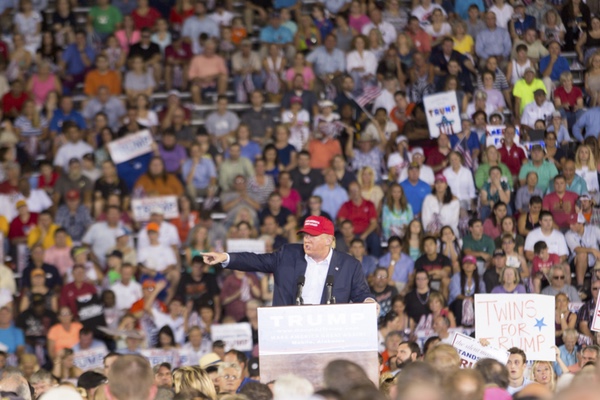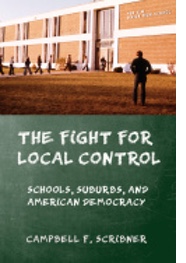Who Counts as an Educated Voter?

The past year’s presidential campaign, culminating with the hard-fought election of Donald Trump, has raised fraught questions for parents and educators about balance, bigotry, and modeling appropriate political behavior. Many of my friends, both conservatives and liberals, consider Trump little less than a demagogue. They ascribe his success to our nation’s anemic system of civic education. If voters are susceptible to vague policy prescriptions, reality-show putdowns, and race-baiting, they argue, it is because we have failed to train them in civic virtues.
 Unfortunately, we cannot know whether
that diagnosis is correct without establishing what constitutes an
“educated voter” to begin with—and on this point I frequently
find myself at odds with my friends.
Unfortunately, we cannot know whether
that diagnosis is correct without establishing what constitutes an
“educated voter” to begin with—and on this point I frequently
find myself at odds with my friends.
The usual criterion for an educated voter seems to be one who understands basic democratic procedures, whether formal political behavior (such as the right to vote) or the informal network of interactions that underlie political behavior (such as free speech and rights of assembly and protest). By these lights, educated voters develop their own political opinions, are tolerant of others’, and engage in an open exchange of ideas. An educated voter submits to the democratic process, whatever his or her particular beliefs may be, and the outcome of the process is taken to be almost incidental.
As educators, broadly defined, are we satisfied with that standard? A recent piece in the New York Times suggests that we are not. In the essay, Bryan Stascavage, an Army veteran enrolled at Wesleyan University, explains in clear prose why he voted for Donald Trump, offering several reasons based on the values imparted at his elite, liberal institution. Surely we should celebrate his efforts to seek out information, reject ideological pieties, prioritize issues of importance, and submit his rationale to public scrutiny. No doubt he is better informed that most voters on either side of the spectrum. Yet the comments section overflows with criticisms that Stascavage misunderstands the political questions at hand and that his reasoning—equating white supremacists and Black Lives Matter protesters, for instance—ignores important social and historical contexts. In short, readers argue that Stascavage has not learned the whole lesson. He cannot be an educated voter because he fails to recognize the contradictions and superficiality of his own thinking.
There is a natural tendency to discount the education of those less experienced or informed than oneself, leading to an embrace of implicit minimum standards of knowledge as well as adherence to the democratic process. Citizens must have some mastery of facts, some degree of eloquence, to engage in the public sphere. But, as educators, where do we draw that line? If we have students, friends, or family members deliberating with incomplete information, what intellectual gains would they need to make to cast an educated vote?
In The Republic Plato manipulatespopular opinion with “noble lies” about patriotism and moral propriety while entrusting power only to the most rational, selfless citizens. But in a world in which all voters are self-interested and all, no matter how well informed, lack full expertise in economics, foreign policy, and other areas vital to good government, demands for enlightened political debate irreducibly limit those able to participate. Short of establishing arbitrary minimums on one hand, or empowering philosophers and submitting to the tyrannical rule of reason on the other, we are thrown back on the relativistic, poorly defined, never-ending task of educational uplift.
Democratic and educational theorists like John Dewey are comfortable with that prospect, an iterative exchange of ideas across levels of ability and experience. Yet it is unclear whether such an exchange will actually lead voters toward consensus, as Dewey hopes, or even narrow their scope of disagreement, which seems like the unspoken goal of those calling for civic education. While Americans with a college education are more likely to support left-leaning candidates than those without, for example, it would be a fallacy to equate college attendance with greater intelligence or public spirit, as it would be to assume a determinative relationship between educational attainment and political consensus. The Stascavage example reminds us that disagreement can flourish at all educational levels, and indeed that liberal education encourages such disagreement. Thus, there is little reason to think that formal educational gains will lead to moderation in the public sphere.
More troubling is whether education would even lead to a more rigorous pursuit of truth. If casting an educated vote requires only adherence to civil liberties and a modicum of relevant information, voters can meet standards of coherency with little regard to the actual merit of their opinions. Editorial boards, religious authorities, and political strategists already provide justifications for all sorts of frivolous positions. If voters faithfully repeat these justifications, but persist in their original viewpoints, is theirs an educated stance? Would critics accept the rationale of Trump voters if it were couched in slightly more sophisticated wording? If so, perhaps we are duty-bound to help the uneducated refine arguments that they struggle to articulate themselves, both to encourage their growth and to ensure our own fair-mindedness. No one would change their mind, but at least the syntax would be better!
This line of thinking encourages nothing more than sophistry, and its flaws should point us in the opposite direction. An unequal distribution of information and maturity means that there will always be intellectual inferiors on the one hand, chafing at the condescension and “enlightenment” of their betters, and superiors on the other, bemoaning the simplicity of those with whom they disagree. Thus, the idealized image of an enlightened electorate is impossible to achieve, and to whatever degree it derives from feelings of superiority or hostility to intellectual diversity, it may not even be a desirable rhetorical goal. If civic education imparts only a basic commitment to civil liberties and marginally improves argumentative clarity—what theorists describe as “thin” democracy—voters will never truly value differences of opinion or resolve the fundamental issues of power and inequality that determine political outcomes.
If we are unsatisfied with superficial adherence to the democratic process, the answer cannot be found in greater information or sophistication, where we all fall short, but in the cultivation of a democratic disposition, which weaves a “thick” social fabric and requires very little formal training. Listening to others, speaking one’s opinion honestly, and exhibiting a willingness to compromise and change one’s mind are the true marks of an educated voter. We should all endeavor to teach and learn from our fellow citizens, but with humility in the knowledge that there is always some group of voters better informed than ourselves.
